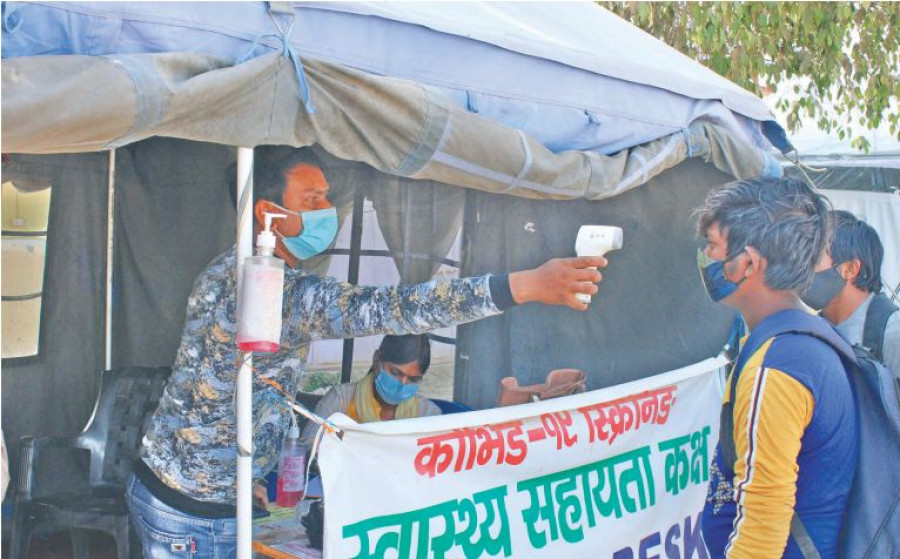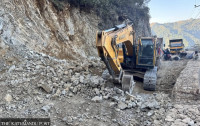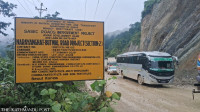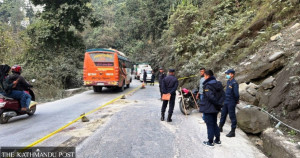Lumbini Province
High risk of Covid spread in absence of quarantine centres
Unlike last year when authorities in Lumbini made quarantining mandatory for returnees, no such measures have been implemented this year.
Madhav Aryal & Birendra KC
Hira Singh Nepali, 45, returned from India on April 15 via Belahiya border point in Bhairahawa. He reached his home in Chhatrakot Rural Municipality-3, Gulmi, the same day. A few days later, he tested positive for the coronavirus. The migrant worker died at home on Saturday.
Thousands of migrant workers returning to Nepal from India via various border points in Lumbini Province are making their way home to different cities and villages across the country. Unlike last year when the local and district governments in Lumbini Province had made quarantining mandatory for returnees, this year there are no such provisions.
Bhim Bahadur BK, along with his friends, returned to Madane Rural Municipality in Gulmi from Gujarat on Friday. This was the second time BK had returned to Nepal amid the coronavirus pandemic. His recent experience was starkly different from last year’s, he says.
“I reached home on Friday. Nobody asked me anything so I came home,” he said. “Last year I stayed at a quarantine facility set up in a local school for 14 days when I returned home. This year no such arrangements have been made.”
The district administration office in Gulmi admits that none of the 12 local units in the district has established quarantine and isolation facilities this year.
According to Rudradevi Sharma, the chief district officer of Gulmi, returnees from India are advised to stay in home isolation for 14 days after reaching their villages. That is the extent of precautions the district administration has adopted this year.
“We have been asked to isolate at home. I plan to get tested for coronavirus if I start showing symptoms in the next few days,” BK said.
Last year, people entering Nepal through various border points were quarantined for two weeks in the public buildings of their respective districts. They could go home only after completing their quarantine stay.
The provincial and local governments were heavily criticised then for the poor management at the border points and quarantine facilities that caused the rapid spread of the disease. Following the criticism, the provincial and local authorities started keeping a record of entrants with their address and sent them to their respective local units. The local units had managed separate bus services to ferry the returnees to their towns and villages.
However, the authorities this time have yet to take concrete steps to prevent the virus from spreading. The returnees are taking passenger buses home, which has increased the risk of community transmission of the disease.
There are 10 local units in Kapilvastu. But not a single local body has managed quarantine and isolation facilities so far.
“The local unit is not concerned about a possible outbreak of Covid-19. Returnees are freely roaming around the settlement,’ said Anup Kumar Chaudhary of Shivaraj Municipality, Kapilvastu.
In Palpa, a 32-year-old man returned home to Rambha Rural Municipality-3 from India a week ago. He reached home directly without undergoing any tests since he did not show any symptoms of coronavirus. He stayed with the family and mingled with the local people. However, his PCR test came positive for Covid-19 a few days ago and he’s now in home isolation. No contact tracing efforts have been made so far.
Deugir Village in Mathagadhi Rural Municipality, Palpa has been sealed after nine people tested positive for the virus.
“PCR tests need to be conducted on more than 500 people who were in contact with the infected people. We have asked people not to come out of their homes,” said Keshav GC, the health unit chief of the local unit.
The situation is also similar in Rolpa, Arghakhanchi, Bardiya and Rukum (East) of Lumbini Province. The returnees gather with family members and villagers without following health security protocols. Unlike last year, the local units seem indifferent to set up quarantine and isolation facilities to contain the virus.
“The local units have not managed quarantine and isolation facilities this year. People returning from India and some of those who test positive for the virus are asked to go home. The settlements are at high risk of virus spread. The mayor, chairman and other people’s representatives are ignoring the possible threat,” said Pashupati Mani Tripathi, a resident of Kapilvastu Municipality-2.
(Manoj Paudel in Kapilvastu, Kamal Panthi in Bardiya, Kashiram Dangi in Rolpa and Hari Gautam in Rukum-East contributed reporting)




 15.12°C Kathmandu
15.12°C Kathmandu











